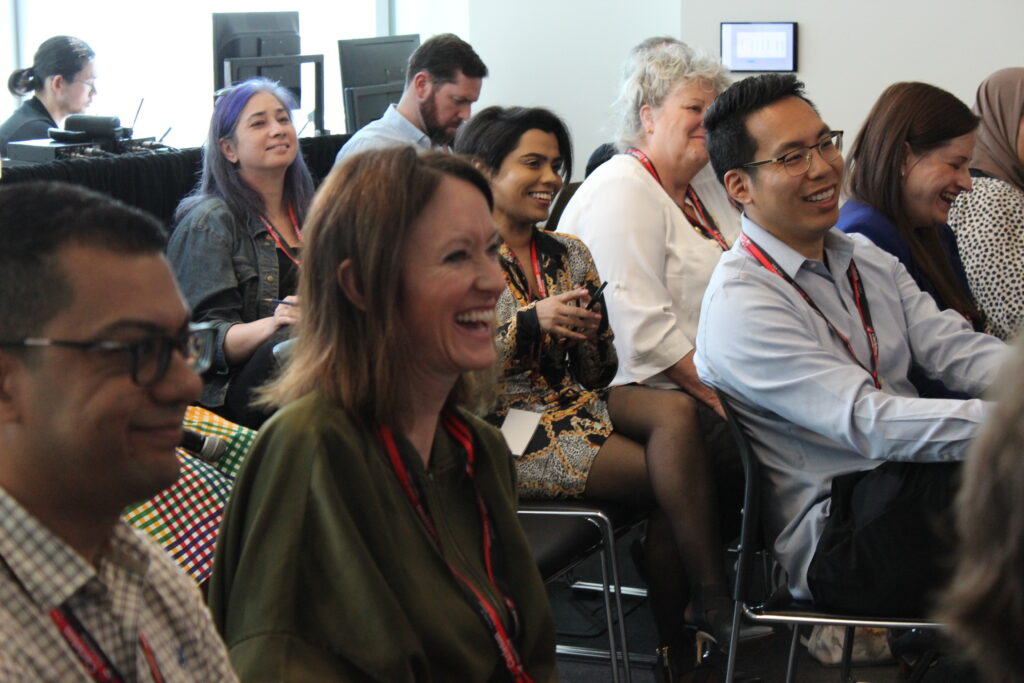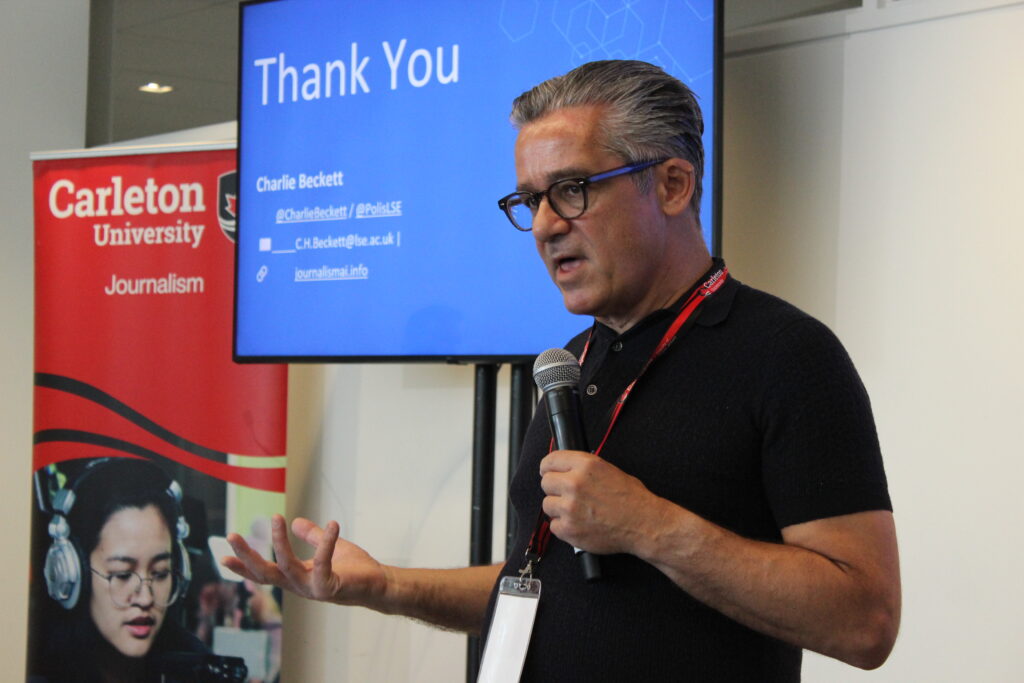In Polis founder Charlie Beckett’s keynote speech at a Carleton University-hosted roundtable on Thursday, he delivered something of a challenge to journalism’s position as gatekeeper of the news in the new age of artificial intelligence.
“I think there’s this myth in journalism that news is in itself valuable commercially,” Beckett said. “It’s not. It’s always been subsidized. It’s always been about people having a habit of news consumption and finding it informationally useful.”
Beckett, who is leading the Polis JournalismAI project at the London School of Economics, explained that the Internet and more recently the advent of AI have increasingly opened up new competition to the once-unchallenged work of news organizations. Beckett said this means newsrooms need to think harder about the needs of their audiences.
“This starting point we have is that journalism is somehow a national park and should be funded,” Beckett said.
Beckett said the onus is on journalists to innovate using AI rather than sit on the sidelines as tech companies continue to push out competing content and make traditional news media obsolete.
“The only solution is to go back and ask yourself, ‘Why would anybody want to consume your journalism?’” Beckett said. “Then build your appropriate model around that.”
“AI works best … when you’re thinking about the reader all the time.”
— Charlie Beckett, director of JournalismAI project at Polis
According to Beckett and journalist and data scientist Nikita Roy, who spoke earlier in the day at the Globe and Mail Centre in Toronto, AI is particularly adept at helping journalists realize their audiences’ demands.
“AI works best … when you’re thinking about the reader all the time,” Beckett said.
For example, British journalist and author Sophia Smith Galer created an AI tool called Sophina, which helps users create viral video scripts. Beckett explained that her program is very personal and specific to her audience.

For all the wonders of AI, Beckett acknowledged the risks attached to the new tech. He broke down the risks as technical, ethical, cultural and managerial challenges. AI has given rise to new forms of disinformation and propaganda that actively undermine news media.
Ultimately, he said the obstacles associated with AI are always human-caused. The same tools that allow false and harmful information to spread can also be used to fight them.
“You always have to remember that any disinformation you see has originally been created by a human being,” Beckett said. “AI doesn’t wake up in the morning and say, ‘I’m gonna create some fake news.’”
For skeptics of AI, Beckett likened the advent of artificial intelligence to the early beginnings of the Internet. He noted that the first newspaper in the world to go online, the Columbus Dispatch, launched on July 1, 1980, far before audiences followed. There was still a lot to figure out.
However, Beckett made it clear that AI is advancing much more rapidly than the Internet did in the 1980s. Newsrooms will be forced to adapt or risk falling by the wayside.
“I think there is a leadership issue here around setting the right culture so people feel more comfortable around (AI),” said Beckett.
He said newsrooms are very aware of AI and intend on utilizing it more in the future, but there’s a hesitancy to adopt it immediately.
“There’s a real sense of St. Augustine’s ‘make me virtuous but not yet O Lord.’ It’s kind of, ‘Yes, this is great, we’re looking at it,’ but they really are holding back,” Beckett said.

Beckett said the initial aversion to AI often stems from the fear of not having the technical know-how. But he argued generative AI has evolved to become so accessible and user-friendly that there is no excuse for journalists not to integrate it into their work.
Earlier, Roy had identified 20 easy ways journalists can implement AI in their journalism right now, including generating headlines, visualizing data, transcribing interviews, analyzing images and converting articles to videos.
‘In the info world in the next five to 10 years, if you are not using these systems and tools, you are just going to be like the person who has never been on social media. Good luck to you, but you’re gonna be left behind.’
— Charlie Becket, keynote speaker, Journalism & Artificial Intelligence: An Industry Roundtable
That being said, Beckett urges journalists not to use AI just for the sake of not being left behind. Beckett said journalists must experiment and collaborate across industries other than their own to determine what works and can be replicated in other situations.
In a best-case scenario, Beckett said his “big hope” for AI in journalism is that it can liberate journalists from their most laborious tasks, such as transcribing, creating alt text and SEO optimization, enabling humans to worry about more creative tasks and specialization, such as identifying trends and human interest stories in the community.
Sooner or later, Beckett said he believes AI will become the next step in the continuum of inevitable technological innovation, akin to the rise of the Internet.
“In the info world in the next five to 10 years, if you are not using these systems and tools, you are just going to be like the person who has never been on social media,” Beckett said. “Good luck to you, but you’re gonna be left behind.”